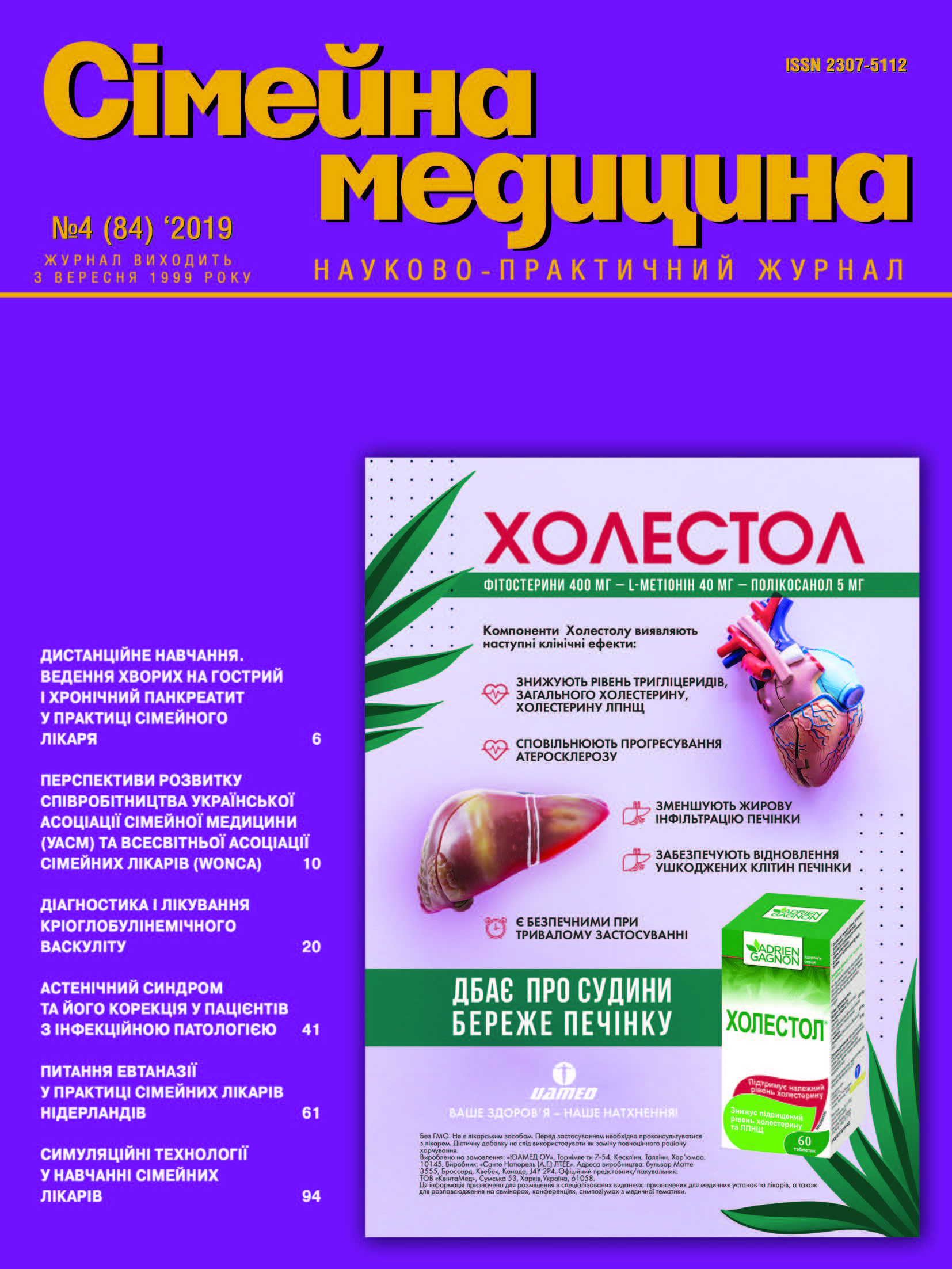Simulation Technologies in Training of Family Drivers
##plugins.themes.bootstrap3.article.main##
Abstract
The objective: feasibility of introducing simulation technologies into the educational process of interns and cadets-doctors in the specialty «General Practice – Family Medicine».
Materials and methods. The article presents the experience of applying the system of Body Interact – clinical clinical education, the educational program of virtual clinical scenarios at the Department of Family Medicine and Therapy, which allows to recreate a certain clinical situation with all necessary modern set of objective, laboratory and instrumental methods of examination and conduct treatment in accordance with modern protocols of European and American medical associations in real time.
Results. The simulation training technologies implement more effective practical training of doctors on specialty «General practice – family medicine», improving the effectiveness of training in 2–3 times.
Conclusions. The using of interactive techniques, including the «Virtual Patient», in the professional training of family doctors, allows to solve the problem situations through effective actions, intuition, training, and the development of communicative skills.##plugins.themes.bootstrap3.article.details##

This work is licensed under a Creative Commons Attribution 4.0 International License.
Authors retain the copyright and grant the journal the first publication of original scientific articles under the Creative Commons Attribution 4.0 International License, which allows others to distribute work with acknowledgment of authorship and first publication in this journal.
References
Булавенко О.В. Досвід застосування симуляційних технологій у навчальному процесі спеціалізованого акушерсько-гінекологічного кластера на базі Вінницького національного медичного університету ім. М.І. Пирогова / О.В. Булавенко, Д.Г. Конькова, І.Л. Кукуруза // Шляхи удосконалення навчального процесу і необхідність впровадження нових підходів у роботі кафедр медичного університету в сучасних умовах : тези доповідей навч.- метод. конф., Вінниця, 26 лютого 2014 р. – Вінниця, 2014. – С. 18–19.
Гевкалюк Н.О. Компетентнісний підхід у професійній підготовці лікарів-стоматологів дитячих / Н.О. Гевкалюк // Медична освіта. – 2018. – № 1 (77). – С. 16–18.
Гусєв В.М. Шляхи оптимізації додипломного навчання на кафедрі акушерства і гінекології / В.М. Гусєв, В.М. Астахов, Є.М. Шевченко // Медична освіта. – 2018. – № 1 (77). – С. 19–21.
Загальні проблеми та перспективи застосування симуляційних методів освіти / В.М. Лісовий, В.А. Капустник, В.Д. Марковський, І.В. Завгородній // Симуляційне навчання в системі підготовки медичних кадрів: матеріали L навч.-метод. конф., присвяченої 212-й річниці від дня заснування ХНМУ, Харків, 30 листопада 2016 р. – Харків, 2016. – С. 3–7.
Подковко Х.В. Інноваційні освітні технології у вищих медичних (фармацевтичних) навчальних закладах: перешкоди та перспективи впровадження / Х.В. Подковко // Вісник. Серія «Педагогічні науки». – 2016. – № 140. – С. 61–64.
Тутченко М.І. Симуляційні технології в навчанні студентів-медиків практичним навичкам / Тутченко М.І., Сусак Я.М. // Вісник Української медичної стоматологічної академії «Актуальні проблеми сучасної медицини». – 2013. – Т. 13, вип. 1 (41). – С. 326–327.
Шляхи підвищення якісного рівня знань / Н.В. Скробач, О.А. Шаповал, В.О. Петрина [та ін.] // Медична освіта. – 2018. – № 1 (77). – С. 50–54.
McLeod R. Science, medicine, and the future / Rory McLeod, Robert Stone // BMJ. – 2001. – V. 323.





